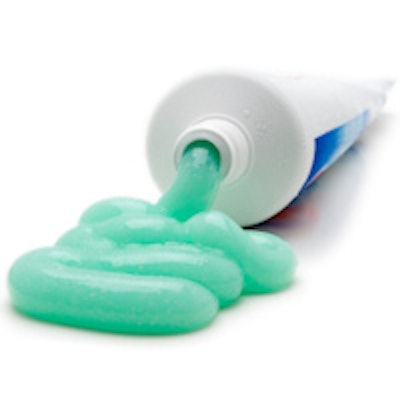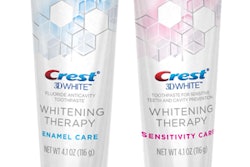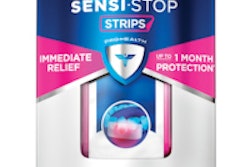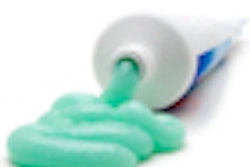
Procter & Gamble will remove polyethylene microbeads from its Crest toothpaste line after a dental hygienist spoke out about finding the blue plastic bits in patients' gums. The microbeads can trap bacteria in the gums and lead to gingivitis, according to some dental professionals, but the ADA said clinical studies show the microbeads don't pose a health risk.
Dentists and dental hygienists in the U.S. have reported noticing the microbeads in people's gums.
"While the ingredient in question is completely safe ... we understand there is a growing preference for us to remove this ingredient. So we will," the company stated in a webpage response that addresses concerns about polyethylene microbeads used in the company's products.
The Crest toothpastes that have microbeads include Crest Pro-Health and Crest 3D White.
Polyethylene, the most common plastic in the world, is used primarily for containers and packaging, such as bottles and plastic grocery bags. But because polyethylene lasts practically forever and isn't biodegradable, environmentalists and others expressed concern. The tiny microbeads are small enough that they can slip through water filtration systems.
Two states, New York and California, have introduced legislation to ban beauty products containing microbeads.
“At this time, clinically relevant dental health studies do not indicate that the Seal (ADA Seal of Acceptance) should be removed from toothpastes that contain polyethylene microbeads.”
Phoenix dental hygienist Trish Walraven, RDH, said she finds the microbeads' blue plastic bits in her patients' mouths almost every day.
"When you have hundreds of pieces of plastic being scrubbed into your gums each day that are even smaller than a millimeter, many of them are getting trapped," she wrote in her DentalBuzz blog post.
"I've been seeing these blue particles flush out of patients' gums for several months now," Walraven wrote in a March entry. "So have many dental hygienists throughout the United States and Canada who have consulted with each other and realized that we have a major concern on our hands."
Patrick Broome, DMD, a cosmetic dentist at the Charlotte Center for Cosmetic Dentistry in North Carolina, said he has also detected the plastic beads in areas of inflammation in several of his patients and suggested they switch toothpaste.
"If these plastic microbeads are left in the gumline, they can cause irritation," Dr. Broome said in a statement. "When a foreign object is left in the pocket around the tooth, it attracts bacteria, which can lead to gingivitis, which can then become periodontal disease. There are small channels around each tooth and if tiny bits of plastic are being scrubbed against your gums, the small plastic pieces can get trapped without you even knowing. Gingivitis can cause gums to be inflamed and to bleed when brushing. Gingivitis that is left untreated leads to periodontal disease which can cause tooth loss."
However, Procter & Gamble noted: "Years of clinical research show no evidence of particles persisting underneath the gumline or causing harm."
The company also pointed out that polyethylene is a U.S. Food and Drug Administration (FDA)-approved food additive, but said that it has started removing microbeads from their toothpastes, and most of their products will be microbead-free by March 2015.
The ADA put its Seal of Approval on the Crest Pro-Health toothpaste line, and said it has no plans to remove it.
"The Council [Council on Scientific Affairs] will continue to monitor and evaluate new scientific information on this issue as it becomes available," according to an ADA statement. "At this time, clinically relevant dental health studies do not indicate that the Seal should be removed from toothpastes that contain polyethylene microbeads."



















